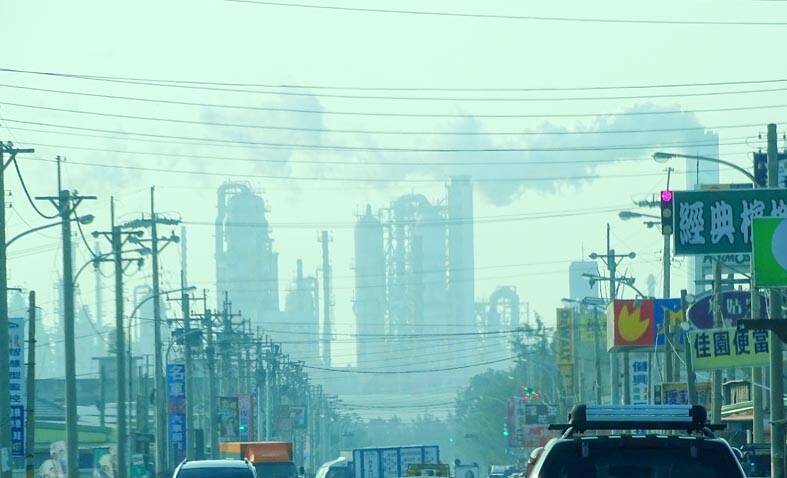Yunlin County had the nation’s highest annual average concentration of airborne particles measuring 2.5 micrometers (PM2.5) or less last year, data from the Ministry of Environment showed.
The county recorded an average PM2.5 concentration of 19.3 micrograms per cubic meter (mcg/m3), followed by nearby Chiayi County and Chiayi City, as well as outlying Kinmen, all at 18.8mcg/m3, the data showed.
Taiwan hopes to lower its annual average PM2.5 level to less than 13mcg/m3 and the annual average PM2.5 concentration in central and southern Taiwan to less than 15mcg/m3 by 2027, the ministry said.

Photo: Chan Shih-hung, Taipei Times
Department of Atmospheric Environment head Chang Shun-chin (張順欽) said that a higher PM2.5 level in central and southern Taiwan was mainly a result of less rain and low wind speeds there.
Those conditions led to particulate matter not being able to diffuse into the air, resulting in the local accumulation of pollutants, he said.
In terms of the annual average concentration of nitrogen dioxide, data showed that Taipei led the nation with 13.87 parts per billion (ppb), followed by Kaohsiung at 11.49ppb.
Areas such as New Taipei City, Taoyuan, Hsinchu City and Taichung also recorded relatively high levels.
Mobile sources of pollution and topography greatly contributed to the situation, Chang said.
For example, in Taipei, a high number of vehicles, coupled with its basin topography and poor dispersion, resulted in higher nitrogen dioxide concentrations.
Additionally, as nitrogen dioxide is a precursor to ozone, the overall ozone concentrations in the western part of Taiwan — where those cities are located — are also higher than those in the east, he said.
The data also showed the status of other major pollutants, such as PM10, an indicator of airborne particles measuring 10 micrometers or less. Yunlin County’s annual average was the highest (41.5mcg/m3), followed by Changhua County (40.8mcg/m3) and Chiayi County (40.2mcg/m3).
These values were below the annual average of 50mcg/m3 set by the ministry.

Right-wing political scientist Laura Fernandez on Sunday won Costa Rica’s presidential election by a landslide, after promising to crack down on rising violence linked to the cocaine trade. Fernandez’s nearest rival, economist Alvaro Ramos, conceded defeat as results showed the ruling party far exceeding the threshold of 40 percent needed to avoid a runoff. With 94 percent of polling stations counted, the political heir of outgoing Costa Rican President Rodrigo Chaves had captured 48.3 percent of the vote compared with Ramos’ 33.4 percent, the Supreme Electoral Tribunal said. As soon as the first results were announced, members of Fernandez’s Sovereign People’s Party

MORE RESPONSIBILITY: Draftees would be expected to fight alongside professional soldiers, likely requiring the transformation of some training brigades into combat units The armed forces are to start incorporating new conscripts into combined arms brigades this year to enhance combat readiness, the Executive Yuan’s latest policy report said. The new policy would affect Taiwanese men entering the military for their compulsory service, which was extended to one year under reforms by then-president Tsai Ing-wen (蔡英文) in 2022. The conscripts would be trained to operate machine guns, uncrewed aerial vehicles, anti-tank guided missile launchers and Stinger air defense systems, the report said, adding that the basic training would be lengthened to eight weeks. After basic training, conscripts would be sorted into infantry battalions that would take

GROWING AMBITIONS: The scale and tempo of the operations show that the Strait has become the core theater for China to expand its security interests, the report said Chinese military aircraft incursions around Taiwan have surged nearly 15-fold over the past five years, according to a report released yesterday by the Democratic Progressive Party’s (DPP) Department of China Affairs. Sorties in the Taiwan Strait were previously irregular, totaling 380 in 2020, but have since evolved into routine operations, the report showed. “This demonstrates that the Taiwan Strait has become both the starting point and testing ground for Beijing’s expansionist ambitions,” it said. Driven by military expansionism, China is systematically pursuing actions aimed at altering the regional “status quo,” the department said, adding that Taiwan represents the most critical link in China’s

EMERGING FIELDS: The Chinese president said that the two countries would explore cooperation in green technology, the digital economy and artificial intelligence Chinese President Xi Jinping (習近平) yesterday called for an “equal and orderly multipolar world” in the face of “unilateral bullying,” in an apparent jab at the US. Xi was speaking during talks in Beijing with Uruguayan President Yamandu Orsi, the first South American leader to visit China since US special forces captured then-Venezuelan president Nicolas Maduro last month — an operation that Beijing condemned as a violation of sovereignty. Orsi follows a slew of leaders to have visited China seeking to boost ties with the world’s second-largest economy to hedge against US President Donald Trump’s increasingly unpredictable administration. “The international situation is fraught